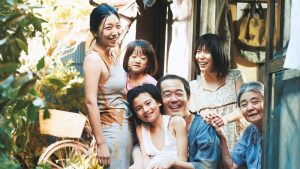
‘Shoplifters’ film review
By Jerrison Oracion, Senior Columnist
4/5
There are a lot of famous Japanese directors who inspired various other directors, like Akira Kurosawa and Yasujirō Ozu. In my opinion the greatest director in Japanese cinema right now and one of my favourites is Hirokazu Kore-eda, who makes films about families and real-life issues. Some of his films include Nobody Knows, Still Walking, Like Father, Like Son, Seaside Diary (officially titled Our Little Sister in English), The Third Murder, and he even directed two of AKB48’s music videos, “Sakura no Ki ni Narou” and “Green Flash”.
Some of Kore-eda’s films were shown in the Cannes Film Festival, including his most recent film and the film that won the Palme d’Or (highest prize) this year, Shoplifters. This film also did very well when it was released in Japan last summer and sold out screenings when it was shown in the Vancouver International Film Festival this year. Shoplifters talks about one of the issues in Japan right now: Low-income families.
Yuri (Miyu Sasaki) runs away from her parents when her mother is being abused by her father. She is found by Osamu Shibata (Lily Franky) and his son, Shota (Kairi Jyo), and they take her in their disorganized house in Northeast Tokyo. The Shibata family does not have a lot of money. They earn it through a variety of ways. Osamu and his wife Nobuyo (Sakura Ando) have low-paying jobs, their daughter Aki (Mayu Matsuoka) works in a sex club, and the grandmother Hatsue (Kirin Kiki) has a pension. They obtain essentials by shoplifting and they do various tricks to avoid being caught. When the Shibatas find out that Yuri’s parents are trying to find their daughter, they disguise her so that she is not recognized—and so that they don’t blow their cover.
Like in all of Kore-eda’s films, the director does shots static in one take to show something unfold from a perspective. Also, you see soft images and a yellowish colour that make his films unique. The shoplifting scenes show the tricks of the shoplifting trade and why it is a bad idea. The film reminds me of the Akira Kurosawa film Dodes’ka-den, especially with the clothes that the family wears.
The end of Shoplifters is a bit disappointing. The last quarter of it turns into a procedural crime drama and feels like it may have used elements from Kore-eda’s film The Third Murder. There are some shots that are similar to the first-person shots in Yasujirō Ozu’s films. I’m worried that Kore-eda might be starting to make more crime films than films about families, and that his future films may not be as good, like Deepa Mehta with Beeba Boys and some of Oliver Stone’s recent films, which in my opinion are very bad.
While this is Kore-eda’s most successful film, I’d say it is not his best work because it had elements that are usually not in his films. Kirin Kiki is great playing Hatsue. Unfortunately, she passed away on September 15, making this film her last. She will probably win Best Supporting Actress in the Japanese Academy Prize (the Japanese version of the Academy Awards) next year. Also, the film could win Best Foreign Language Film in the Academy Awards next year, though the Academy might give it to Pawel Pawlikowski’s Cold War instead.
Hopefully Shoplifters will get more people in Japan to talk about low-income families and how to solve the problem. Shoplifters opens in limited release soon.
